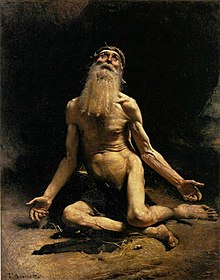Elihu, The Passerby

Elihu is the fourth person to address Job and provide an explanation for his suffering. Elihu is not mentioned in the prologue for being a friend of Job (Job 2:11). Elihu is also not mentioned among the friends for whom Job prayed for forgiveness (Job 42:9).
Elihu was younger than Job and his three friends, “Elihu had waited to speak to Job, because they were older than he” (Job 32:4). This is the reason he had to wait for his turn to speak. Elihu felt compelled to speak because Job’s friends were unable to convince Job that he had sinned against God. So, Elihu, who was only a passerby, felt that he had to speak in order to correct them.
Some scholars believe that Elihu was a wisdom teacher who was uncomfortable with Job’s declaration of innocence. Others believe that he was just a person who was interested in what Job and his friends were discussing. Since Elihu was younger than Job and his friends, he probably was just a passerby who became involved in the discussion when he realized that his elders were unable to win the argument.
Elihu is identified as the son of Barachel the Buzite, of the family of Ram (Job 32:2). The name Barachel is only mentioned in the book of Job. Elihu belongs to the clan of Ram. This clan was part of the tribe of Judah. This seems to indicate that Elihu was an Israelite.
Elihu Speaks to Job’s Friends
When Elihu begins to speak, he is angry because of what Job had said about himself and God, “Elihu was angry at Job because he justified himself rather than God; he was angry also at Job’s three friends because they had found no answer, though they had declared Job to be in the wrong” (Job 32:2–3).
Elihu begins his speech by criticizing Job’s friends for their ineptitude. He says that wisdom does not come with age. Elihu said, “I am young in years, and you are aged; therefore I was timid and afraid to declare my opinion to you. I said, ‘Let days speak, and many years teach wisdom.’ But . . . It is not the old that are wise, nor the aged that understand what is right” (Job 32:6–9).
Elihu rebukes Job’s friends for being unable to convince Job of his ways, “I gave you my attention, but there was in fact no one that confuted Job, no one among you that answered his words” (Job 32:12).
Elihu Speaks to Job
After speaking to Job’s friends and pointing out their failure to convince Job of speaking against God, Elihu speaks to Job. Elihu promises to be honest in his evaluation of Job, “But now, hear my speech, O Job, and listen to all my words. See, I open my mouth; the tongue in my mouth speaks. My words declare the uprightness of my heart, and what my lips know they speak sincerely” (Job 33:1–3).
Elihu then challenges Job to debate him, “Answer me, if you can; set your words in order before me; take your stand” (Job 33:5). Elihu quotes Job’s declaration of innocence, “You say, ‘I am clean, without transgression; I am pure, and there is no iniquity in me. Look, he finds occasions against me, he counts me as his enemy; he puts my feet in the stocks, and watches all my paths’” (Job 33:9–11).
Elihu tells Job that he is wrong; God is not like that, “But in this you are not right. I will answer you: God is greater than any mortal. Why do you contend against him, saying, ‘He will answer none of my words’?” (Job 33:12–13). Elihu says that God is always speaking to people, but people refuse to listen to the voice of God.
Elihu says that God is always trying to prevent humans from sinning, but when they sin, God uses illness to teach them and to save them from their sins. According to Elihu, God “opens their ears, and terrifies them with warnings, that he may turn them aside from their deeds, and keep them from pride, to spare their souls from death” (Job 33:16–18).
However, if they refuse to hear the voice of God, “They are also chastened with pain upon their beds, and with continual strife in their bones” (Job 33:19). By charging Job with sin, Elihu is denying Job’s statement that God was being cruel in the way God was treating him.
Elihu believes that Job’s illness and his approaching death are evidence that God is telling him to repent. Elihu talks about a mediator, “if there should be for one of them an angel, a mediator, one of a thousand, one who declares a person upright” (Job 33:23). Job had asked for a mediator, but Elihu’s proposed mediaator differs from Job’s idea of a mediator.
Job’s mediator would be someone who would take his case to the divine court and show that God was wrong in punishing him. Elihu’s mediator would be someone who would take Job’s case and show that Job was wrong. Elihu’s mediator convicts the wicked, and once that person recognizes his sins, then “he prays to God, and is accepted by him” (Job 33:26). In his prayer, that person would say, “I sinned, and perverted what was right” (Job 33:27).
Elihu Speaks to the Wise
After speaking to Job’s friends and to Job, Elihu speaks to a different audience, “Hear my words, you wise men, and give ear to me, you who know” (Job 34:2). This audience of wise men and educated people may be a reference to people who had come to see Job and hear the dialogue between Job and his friends.
Elihu calls his audience to compare what Job had said with what he is saying. Job had said, “I am innocent, and God has taken away my right; in spite of being right I am counted a liar; my wound is incurable, though I am without transgression” (Job 34:5–6).
Elihu accuses Job of perjury by claiming to be innocent. Elihu mocks Job by saying that he was a great sinner, “Who is there like Job, who drinks up scoffing like water, who goes in company with evildoers and walks with the wicked?” (Job 34:7–8). Elihu defends God by saying that God does not do wrong and that evil people receive what they deserve.
Elihu said, “far be it from God that he should do wickedness, and from the Almighty that he should do wrong. For according to their deeds he will repay them, and according to their ways he will make it befall them. Of a truth, God will not do wickedly, and the Almighty will not pervert justice” (Job 34:10–12).
Elihu presents a long defense of God’s justice (Job 34:13–30). Elihu says that God is a fair judge who imposes fair sentences. He says that God knows everything people do, “his eyes are upon the ways of mortals, and he sees all their steps” (Job 34:21), thus God is able to deal with injustice, “He shatters the mighty without investigation, and sets others in their place. Thus, knowing their works, he overturns them in the night, and they are crushed. He strikes them for their wickedness” (Job 34:24–26).
Elihu tells his audience that Job is wrong and that his claim of innocence is an affront to God, “Job speaks without knowledge, his words are without insight. Would that Job were tried to the limit, because his answers are those of the wicked. For he adds rebellion to his sin; he claps his hands among us, and multiplies his words against God” (Job 34:35–37).
Elihu Tells Job He Is Wrong
Elihu now addresses Job again and tells him that he is wrong. Job has declared his innocence. He had asked, “What have I done to deserve this punishment?” Elihu says, “I will answer you and your friends with you” (Job 35:4). Elihu says that neither human righteousness nor human wickedness can affect God.
Elihu says that Job’s sins are causing harm to people in his community, “Your wickedness affects others like you” (Job 35:8). Elihu tells Job that God is silent because he does not answer prayers that are not sincere, “[the wicked] cry out, but he does not answer, because of the pride of evildoers. Surely God does not hear an empty cry, nor does the Almighty regard it. How much less when you say that you do not see him, that the case is before him, and you are waiting for him” (Job 35:12–14).
Elihu asks Job to have patience with him while he presents God’s case, “Bear with me a little, and I will show you, for I have yet something to say on God’s behalf” (Job 36:2).
Elihu presents himself as a person who has the perfect knowledge to talk about God, “I will bring my knowledge from far away, and ascribe righteousness to my Maker. For truly my words are not false; one who is perfect in knowledge is with you” (Job 36:3–4). What God does is to punish the wicked and defend the oppressed person, “He does not keep the wicked alive, but gives the afflicted their right” (Job 36:6).
In presenting God’s case to Job and to his audience (Job 36:6–33), Elihu says that God sees and knows what people are doing and when God sees a person acting wickedly, that person is warned by God. “If they listen, and serve him, they complete their days in prosperity, and their years in pleasantness” (Job 36:11). But if they do not listen, “they shall perish by the sword, and die without knowledge” (Job 36:12).
Elihu concludes his speech (Job 37:1–24) by describing the majesty of God’s creation and the terror caused by the thunderstorm, which Elihu considers to be the voice of God. He then asks Job a series of questions which emphasizes Job’s unworthiness to challenge the justice of God. Elihu condemns Job’s attitude toward God and concludes his speech by saying “The Almighty, . . . is great in power and judgment, has more than enough righteousness, and does not oppress” (Job 37:23).
An Evaluation of Elihu
In his speech to Job, Elihu said that he had perfect knowledge and that what he was saying about God was the truth. But, was Elihu right? Throughout his speech he emphasized that Job was a sinner who was receiving what he deserved. A careful evaluation of Elihu’s speech clearly reveals that Elihu’s words to Job and his audience did not provide a good explanation for Job’s suffering because everything he said contradicted what God had said about Job in the prologue of the book.
The prologue introduces the reader to the circumstances which led to Job’s suffering. Satan believed that Job’s life of faithfulness and dedication to God was motivated by the blessings God had bestowed on him.
Elihu is an enigmatic character in the book of Job. He appears in the book without an introduction. He speaks to Job’s friends, to Job, and to other people and then he is never heard from again, even in the epilogue when God rebukes Job’s friends.
The book of Job introduces Elihu as a young man who had listened to the dialogue between Job and his friends. At the end of the dialogue, Elihu was angry at Job because Job “justified himself rather than God” (Job 32:2). Elihu was also angry at Job’s friends because Job’s friends were unable to answer Job’s defense of his innocence and Job’s charges against God. Elihu believed that Job and his friends were offending God. Throughout his speech, Elihu saw himself as a defender of God.
Elihu emphasizes that true knowledge of God is not found in the wisdom of the elders but in the revelation of God to humans, “For God speaks in one way, and in two, though people do not perceive it” (Job 33:14). It is for this reason that Elihu rebukes Job because he speaks that which he does not know, for Job defends his innocence by accusing God, that he defends his righteousness by challenging God.
Most of Elihu’s speech is focused on the justice of God. Elihu is not interested in the reason why Job is suffering. To Elihu, God is just, and Job is deserving of his suffering because of his attitude toward God.
So, was Elihu right? Elihu was right when he defended the justice and righteousness of God. He was also right when he said that Job spoke without knowledge. However, Elihu’s explanation for Job’s suffering was not right.
Without the benefit of the prologue, the reason for Job’s suffering would be shrouded in mystery. Job’s suffering must be understood in the interplay between God’s sovereignty and the vast complexity of the world God created. As God will reveal when he speaks to Job “out of the whirlwind” (Job 38:1), God’s creation is vast and complex and there are many things humans do not know nor understand about the ways of God in the world. One of the many things humans do not understand is the mystery of suffering.
For all nine lessons on this series, visit my post on Studies on the Book of Job.
Note: For other studies on the Book of Job and the problem of suffering, read my post, An Introduction to the Book of Job.
NEXT: LESSON 7 – “Job’s Views of God”
Claude Mariottini
Emeritus Professor of Old Testament
Northern Baptist Seminary
NOTE: Did you like this post? Do you think other people would like to read this post? Be sure to share this post on Facebook and share a link on Twitter or Tumblr so that others may enjoy reading it too!
I would love to hear from you! Let me know what you thought of this post by leaving a comment below. Be sure to like my page on Facebook, follow me on Twitter, follow me on Tumblr, Facebook, and subscribe to my blog to receive each post by email.
If you are looking for other series of studies on the Old Testament, visit the Archive section and you will find many studies that deal with a variety of topics.












